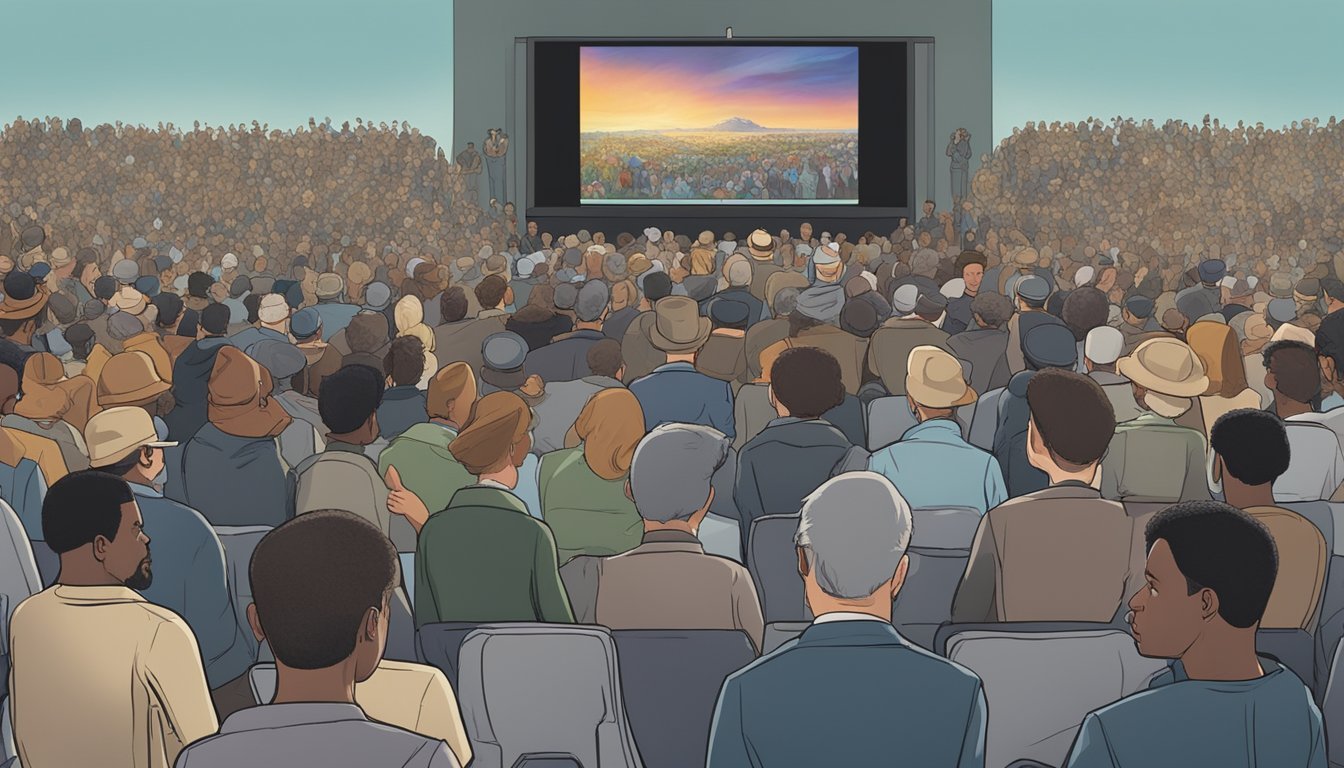Documentary Review: Dick Johnson Is Dead (2020)
An Emotional Exploration of Mortality
Kirsten Johnson's "Dick Johnson Is Dead" is a deeply personal and inventive documentary that blends raw emotion with dark humor. In the film, Johnson confronts her father's dementia by creatively staging his death in various scenarios. This unique approach not only helps her cope but also offers viewers a touching exploration of love, loss, and the inevitable reality of mortality.
The documentary stands out for its imaginative and surreal representation of death, juxtaposed with the genuine bond between father and daughter. This stylistic choice keeps viewers engaged, making them reflect on their relationships with loved ones while witnessing Dick Johnson's journey through declining health. Humor and heartfelt moments are carefully balanced throughout the film, providing a memorable viewing experience.
As Dick Johnson's condition worsens, the collaborative effort between Kirsten and her father brings a sense of intimacy and warmth to the film. This mixture of playfulness and tenderness creates an impactful narrative that speaks to the universal human experience of dealing with aging and loss.
Overview of 'Dick Johnson Is Dead'
"Dick Johnson Is Dead" is a powerful exploration of mortality, blending documentary filmmaking with imaginative reconstructions. Kirsten Johnson uses this unique approach to confront her father’s Alzheimer's diagnosis and impending death.
Plot Synopsis
"Dick Johnson Is Dead" centers on filmmaker Kirsten Johnson and her father, Dick Johnson. The documentary depicts Dick's staged deaths in various scenarios to address the inevitability of his passing. Kirsten uses these setups to process her feelings about losing her father. The narrative mixes heartfelt moments and dark humor, exploring themes of life, death, memory, and family. Through these reenactments, both Kirsten and Dick find a way to confront the emotional reality of aging and mortality.
Film Style and Genre
This film is a hybrid of documentary and surreal comedy. It combines raw, candid moments with theatrical, exaggerated reenactments of Dick's death. The surreal episodes use special effects and dramatic setups to create a dreamlike quality. The style blurs the line between reality and fiction, adding layers of absurdity and poignancy. Kirsten Johnson employs these techniques to invite viewers into a deeply personal yet universally relatable journey, making the film stand out in the documentary genre.
Release and Reception
"Dick Johnson Is Dead" premiered at the Sundance Film Festival in January 2020. It was later released on Netflix, extending its reach to a global audience. The film received widespread acclaim for its innovative approach and emotional depth. Critics praised Kirsten Johnson's unique vision and the heartfelt performances, particularly highlighting the touching portrayal of the father-daughter relationship. The film holds high ratings on major review aggregates, reflecting its positive reception from both audiences and critics alike.
Director Kirsten Johnson's Vision
Kirsten Johnson's vision for "Dick Johnson Is Dead" combines innovative storytelling with deeply personal elements, crafting a unique and touching documentary.
Creative Approach
Kirsten Johnson employs a unique blend of surrealism and reality in her documentary. She stages her father’s death in various, often fantastical scenarios. This inventive approach not only explores the concept of mortality but also allows viewers to confront the emotional complexity of losing a loved one.
Her unconventional methods include recreating dramatic events and utilizing imaginative visual effects. These techniques break traditional documentary norms, transforming the film into an amalgamation of reality and fiction. Kirsten's creative direction ensures the film is visually engaging and emotionally resonant.
Personal Connections to the Film
The film is a love letter to her father, Dick Johnson, and documents his battle with dementia. Kirsten's intimate perspective provides a heartfelt, authentic look into the realities of aging and memory loss. Her personal connection to the subject matter adds depth and sincerity to the narrative.
She captures moments of both humor and heartbreak, highlighting the bond between father and daughter. This relationship is central to the film's emotional impact. Kirsten’s presence is felt throughout, making the documentary not just about Dick Johnson's life, but also about her experience as a witness to her father's decline.
Thematic Analysis
At its core, Dick Johnson Is Dead intertwines themes of mortality, the fluid boundary between fact and fiction, and deep familial bonds. These themes offer a poignant exploration of human experience and emotional resilience.
Exploration of Mortality
In Dick Johnson Is Dead, filmmaker Kirsten Johnson scrutinizes the inevitability of death through staged reenactments of her father's demise. This approach confronts the fear and sadness surrounding death, making it less abstract and more tangible. The repeated, imaginative depictions of Dick's death serve to normalize the concept, fostering an open dialogue about a typically taboo subject. The documentary transforms death from a distant fear into a series of manageable, almost absurd events, encouraging viewers to reflect on their mortality and that of loved ones.
Interplay of Fact and Fiction
The film masterfully blurs the lines between reality and make-believe. The staged deaths, although fictitious, carry genuine emotional weight and reveal deeper truths about the characters. This interplay challenges traditional documentary norms by blending documentary footage with imaginative scenarios. Kirsten's method allows for a creative exploration of truth, showcasing how fictional elements can illuminate real emotional and psychological states. This hybrid storytelling technique invites audiences to consider how personal narratives can be both true and contrived, adding depth to the viewer's understanding of the featured individuals.
Family Dynamics and Filial Love
At its heart, the documentary is a testament to the love and bond shared between Kirsten and her father. The film reveals the intimate moments of care, humor, and vulnerability that define their relationship. Kirsten's project acts as an act of love, showing her dedication to preserving her father's memory while he's still alive. The candid moments between father and daughter emphasize the strength of familial connections, showcasing how love can be an anchor in the face of life's ultimate uncertainty. This theme resonates deeply, reminding viewers of the importance of cherishing and celebrating familial relationships.
Cinematography and Visuals
The film "Dick Johnson Is Dead" excels in its creative and poignant visual storytelling. It effectively combines staged reenactments, surreal dream sequences, and archival footage to enhance the narrative.
Reenactments and Dream Sequences
The documentary uses reenactments to depict various imagined deaths of Dick Johnson, contributing to the film's unique tone. These staged scenes, orchestrated by Kirsten Johnson, are designed to be both humorous and jarring. The dream sequences, often surreal, push the boundaries of traditional documentary form, offering a visual representation of emotions and thoughts that are otherwise difficult to capture.
Each scene is meticulously crafted to reflect themes of mortality and love. The use of special effects and creative set designs further enhances the whimsical and heartfelt nature of these sequences.
Use of Archival Footage
In addition to the staged scenes, the film integrates archival footage, providing a more intimate look at Dick Johnson's life. This footage, which includes home videos and old photographs, gives viewers a sense of his personal history and his relationships with family and friends.
Archival material is skillfully edited into the narrative, serving as a poignant counterpoint to the fictional reenactments. It grounds the film in reality and adds depth to the portrayal of Johnson's character. This blend of past and present creates a richer, more engaging visual experience.
Critical Reception
"Dick Johnson Is Dead" has been well received by both critics and audiences. The film stands out for its unique approach to a deeply personal and emotional subject.
Critics' Reviews
Critics praised the documentary for its inventive storytelling and emotional depth. Roger Ebert’s review highlights the film's exploration of mortality through staged deaths of Dick Johnson, which are both poignant and surreal. Variety lauded Kirsten Johnson’s film as a rich paternal tribute that resonated emotionally with viewers, particularly noting its debut at the Sundance Film Festival.
The film's balance of humor and heartbreak was frequently cited as a standout feature. Other reviews emphasized its ability to turn a personal story into a universally relatable experience, making complex subjects accessible.
Audience Response
Audience responses were equally enthusiastic. Viewers connected deeply with the film's honest and heartfelt portrayal of a father-daughter relationship. The documentary's availability on Netflix broadened its reach, facilitating widespread discussion and acclaim.
Many audience members appreciated the candid exploration of dementia and mortality. Social media and online reviews often described the film as moving and thought-provoking. The blend of humorous moments with serious themes struck a chord, making the documentary both engaging and enlightening.
Soundtrack and Score
The soundtrack of Dick Johnson Is Dead plays a vital role in shaping the film's emotional landscape. It includes a mix of original compositions and carefully selected songs that enhance the storytelling.
Original Music: The original score, composed by Jóhann Jóhannsson, creates an emotional resonance that aligns with the film's introspective nature. The music reflects the blend of humor and sorrow that defines the documentary's unique tone.
Selected Songs: In addition to the original score, the film integrates various songs that complement key scenes. These tracks range from classical pieces to contemporary songs, each chosen to reflect the film's themes of memory, loss, and love.
Emotional Impact: The interplay between sound and visuals is crucial. The score underscores poignant moments, adding depth to the scenes where Kirsten Johnson stages her father’s repeated "deaths."
Dick Johnson Is Dead uses its soundtrack not just as background music but as a storytelling tool. The compositions and selected songs help in creating an immersive experience that captures the complexity of human emotions conveyed in the film.
Cultural and Societal Impact
"Dick Johnson Is Dead" by Kirsten Johnson challenges the typical documentary format. It combines deep emotional resonance with imaginative reenactments. This has sparked discussions on how documentaries can explore sensitive subjects.
The film addresses elderly care and the fear of losing loved ones. Many viewers resonate with its depiction of dementia and aging, spotlighting often-ignored societal issues.
The unique approach, mixing humor and sorrow, has inspired other filmmakers. It showcases how creativity in documentary filmmaking can push boundaries.
Viewers from diverse backgrounds have found the film speaks to universal experiences. This broad appeal marks it as a significant cultural piece.
Public discussions around the movie have brought mental health and family dynamics into focus. It encourages open conversations around these often-taboo subjects.
Awards and Recognition:
Sundance Film Festival
Gotham Awards
These recognitions highlight its impact and importance in contemporary society.
By blending personal and universal themes, "Dick Johnson Is Dead" leaves a lasting impression on audiences and the documentary genre.
Conclusion
"Dick Johnson Is Dead" offers a poignant blend of humor and heartache. Kirsten Johnson crafts a unique narrative that documents her father's advanced age and cognitive decline, while using staged deaths to explore themes of mortality.
The film's approach adds a layer of creativity to a subject often treated with solemnity. This blend of reality and reenactment provides a fresh perspective on the inevitable end of life.
By intertwining personal moments with imaginative scenarios, "Dick Johnson Is Dead" transcends traditional documentary storytelling. This inventive method captures the essence of holding onto a loved one, even as they begin to slip away.
Kirsten Johnson's emotional connection to her father is evident throughout. The tenderness mixed with candid humor creates a deeply personal yet universally relatable experience.
Ultimately, the documentary stands out for its innovative take on a universal topic. Its balance of whimsy and weight makes it both thought-provoking and entertaining.






